L’Aquila: Saint Bernardine of Siena and Saint Celestine V
Basilica di Santa Maria di Collemaggio (Piazzale di Collemaggio, L’Aquila; daily 9:30am-12:30pm/3:30pm-6pm)
Basilica di San Bernardino (Via San Bernardino, L’Aquila; for current opening hours see www.basilicasanbernardino.it)
The town of L’Aquila, in the heart of the Abruzzo region in central Italy, can easily be reached by bus (leaving every hour or so from Rome’s Tiburtina station; the journey takes approx. 90 minutes).
L’Aquila was heavily damaged in the 2009 earthquake which destroyed large parts of the historic center. The damage can be seen to this day, with many homes and precious historic buildings in ruin, entire areas cordoned off, covered in dust and left to their fate. L’Aquila’s most famous historic landmarks have, however, now been repaired and reopened, including the two basilicas housing the relics of St. Bernardine of Siena and Pope St. Celestine V.
Pope Celestine V‘s tomb can be visited in the 13th century Basilica di Santa Maria di Collemaggio. Pietro da Morrone, taking the name of Celestine V, was crowned Pope in this basilica in 1294, and was later buried there as well.
L’Aquila is also the resting place of St. Bernardine of Siena, the famous Apostle of Italy and promoter of the devotion to the Holy Name of Jesus. The Basilica of San Bernardino, built in the 15th century in honor of the great saint, and gravely damaged by the 2009 earthquake, was restored and reopened in 2015. Saint Bernardine’s incorrupt body, exposed for several years in a glass urn at a side altar, has recently been placed back in the newly repaired mausoleum.
SAINT BERNARDINE OF SIENA – THE APOSTLE OF ITALY
There is an extraordinary connection between St. Bernardine and the great saint, apostle and miracle worker St. Vincent Ferrer. When St. Vincent was preaching in Alessandria in Lombardy in 1408, he foretold the crowd that there was one among them, a young religious of St. Francis, to whom he would bequeath the evangelization of parts of Italy that he himself could not undertake. He also predicted that this successor of his would become famous throughout Italy and that his doctrine and example would produce great fruit in the people. Bernardine was then a young Franciscan friar, having made his profession in 1404.
From pious young man to Franciscan friar
Bernardino Albizzeschi was born in Massa Marittima, some 30 miles (50km) from Siena, on September 8, 1380, to noble parents. His father held the post of the governor of Massa. Both his parents died within a few years and at the age of 6 Bernardine became an orphan. He was raised by his aunt and later, after her death, by other equally pious family members.
Young Bernardine excelled in learning. He was modest, humble, devout, and took great delight in prayer, visiting churches, serving at Mass, and hearing sermons, which he would repeat again to other boys. His mere presence was enough to inspire good behavior in others; the announcement “here comes Bernardine” would act as a complete check upon any unguarded conversation among his companions. He fasted rigorously from early age, and had a great love and devotion to Our Lady, whom he regarded as his Mother and special Patroness.
In 1397, after a course of civil and canon law, he joined the Confraternity of Our Lady in the hospital of Santa Maria della Scala in order to serve the sick. Here he began with new vigor to tame his flesh by severe fasts, watchings, hair-shirts, disciplines, and other austerities; but he applied himself even more to the interior mortification of his will, which rendered him always sweet, patient and affable to everyone. He had served this hospital for four years when, in 1400, Siena was visited by the plague. 80,000 of its inhabitants died within four months, including almost all the priests, doctors, and servants in the hospital.
Though this service meant an almost certain death, Bernardine’s example attracted other pious young men who joined him to tend to the sick and dying: “What is greater or more beautiful than in time of peace to attain to the martyr’s crown?”, were Bernardine’s words of encouragement to his companions. God preserved him from the contagion during these four months, at the end of which the pestilence ceased. Upon returning home Bernardine was so exhausted he became ill with fever. He was scarcely recovered when he returned to the works of charity, and with incredible patience and devotion attended, during fourteen months, a dying aunt.
After her death Bernardine decided to abandon the world and serve God alone. He took the habit of the Order of St. Francis (Order of Friars Minor) among the Fathers of the Strict Observance at Colombiere, a solitary convent near Siena. He made his profession on September 8, 1404. Having been born on the feast of the Nativity of the Blessed Virgin, out of devotion to her, he chose the same day for all the principal actions of his life: on it he took the religious habit, made his vows, said his first Mass, and preached his first sermon.
The young friar was noted by his rigorous austerity to himself and his meekness and charity to others. His superiors, perhaps foreseeing his future fame, allotted to him the humiliating office of begging for alms in his paternal city of Siena.
This was a time when passions ruled, and sensuality and love of money had perverted men’s hearts. Bernardine and his companion were often disrespected and mocked as they went around soliciting alms. Many of his own family members were hostile, considering, in their worldly spirit, that he had spoiled the hopes of the family and dishonored them by choosing an “idle life” of a monk. Bernardine took the insults, contempt and humiliations in a true spirit of humility and self-denial, finding in them a joy and satisfaction.
These and all other virtues he learned in the living book of Christ crucified, which he studied night and day, often prostrate before a crucifix, from which he one day heard our Lord speak to him thus: “My son, behold me hanging upon a cross. If you love me, or desire to imitate me, be also fastened naked to your cross and follow me. Thus you will assuredly find me.” In the same school he learned an insatiable zeal for the salvation of souls, redeemed by the blood of Christ.
After Bernardine was ordained priest, his superiors commissioned him to preach as a missionary to the Italians who were falling away from their faith. Bernardine’s talent for preaching was hindered by a natural impediment: he suffered from hoarseness and could not make his voice heard. He asked God, by the intercession of the Blessed Virgin, that, should it be His will that he become a preacher, He may deliver him from this infirmity. As he thus prayed he saw a fiery globe descend from Heaven and touch his throat, which was instantly cured. From then on Bernardine’s voice was powerful and clear.
The Apostle of Italy
His fame as a preacher started to spread in 1418, ten years after St. Vincent’s prediction and one year before the death of the great Spanish saint. Bernardine, who was to become famous as the Apostle of Italy, emulated St. Vincent in his mode of life – going from place to place to preach and convert sinners. Every day, after devoutly celebrating Mass, he preached to the crowds who gathered from neighboring towns and villages to hear him.
In his sermons, which often lasted three or four hours, he exhorted people to return to God and the practice of the faith, abandon their vices, and do penance in order that Divine anger might be appeased.
The people at the time had strayed from the faith; magic and sacrileges abounded, Mass on Sundays and feast days was rarely attended, confession became a once-a-year and often only a death-bed issue. Bernardine labored to inculcate in souls a sincere contempt for the vanity of the world and an ardent love of our blessed Redeemer. He attacked immorality, blasphemy, usury, gambling, luxury in women’s dress, as well as the enmity produced by political factions.
When other priests consulted him for advice, Bernardine gave them a simple rule: “In all your actions, seek in the first place the kingdom of God and His glory. Direct all you do purely to His honor. Persevere in brotherly charity, and practice first all that you desire to teach others. By this means the Holy Spirit will be your master, and will give you such wisdom and such a tongue that no adversary will be able to stand against you.”
St. Bernardine, the greatest preacher of his time, played a great part in the religious revival of the early fifteenth century. For more than 30 years he preached all over Italy, journeying on foot, attracting crowds of 30,000, following St. Francis of Assisi’s admonition to preach about “vice and virtue, punishment and glory.” Nothing was more spoken of in Italy than the wonderful fruits of his sermons: miraculous conversions, restitutions of ill-gotten goods, reparations of injuries, and heroic examples of virtue.
Fight against sin and moral corruption
Bernardine’s uncompromising stance against vice couldn’t fail to make enemies. When he was preaching in Milan, the Duke Visconti, taking offense at certain things he had said in his sermons, threatened the saint with death if he should speak any more on such subjects. Bernardine replied that no greater happiness could befall him than to die for the truth.
The Duke then tried to entrap Bernardine by sending him 500 florins with the request that he spend them on himself. The saint refused but the Duke’s servant kept insisting; thus Bernardine took the money and went, in the presence of said servant, to the prison where he used the money to rescue those detained for debt owed to usurers. Two prisoners were left, for the money did not suffice to rescue them. Bernardine promised them to obtain sufficient money to release them, or else to offer himself as a prisoner that they may be freed. The Duke, hearing how the saint spent his money, changed his attitude toward Bernardine and willingly paid the debt of the remaining prisoners.
St. Bernardine frequently preached against the evil of usury which, practiced mostly by Jews, was destroying the lives of many Christians (as well as concentrating all the money of a city into a few hands). He urged rulers and city executives to take stringent steps against everyone involved in the business of usury. [St. Bernardine was one of the first theologians to write an entire work devoted to Scholastic economics. His book, On Contracts and Usury, dealt with the justification of private property, the function of the business entrepreneur, the ethics of trade, the determination of value and price, and the issue of usury.] The saint was equally fearless and unapologetic at speaking out and condemning others who were responsible for the moral corruption of his time (including sodomites, whom he called to be isolated or eliminated from the community).
Most Italian cities at the time were split between rival and warring political factions – most notably the Guelphs and the Ghibellines. Bernardine’s efforts to make peace were often crowned with success. Preaching in Perugia – one of the cities most divided by the hatred – he exhorted people to keep peace among themselves. All who were present promised to do so except one young nobleman with his followers. The saint admonished him publicly, warning him that if he didn’t promise to keep peace he would not enter his house alive. The nobleman, having mocked the prophetic words, fell dead just as he was about to enter his house.
St. Bernardine always spoke plainly, without regard for human respect, in order to produce fear of God in the hearts of wicked and depraved men. At one occasion he announced to inhabitants of a town that he would show them the devil. When the multitude gathered in expectant awe, he said, “Whereas I promised to show you one devil I will show you many. Look you one at another, and thus you will see devils, for you yourself are devils, doing his work.”
The holy friar often preached against vanity, excess of luxury, and immodesty in women’s dress, and more generally against the fatal desire to shine in the world. He attacked the blindness of parents who in their worldliness seek brilliant marriages for their daughters at all cost; mothers who dress and paint their daughters so that all may look upon them, fathers who only care to marry their daughters to rich men instead of honest and pious ones. He warned parents that they are thus hastening to eternal damnation and taking their daughters with them.
He also denounced the deceit performed by women who resort to artificial means to make themselves appear something they aren’t. Elsewhere he condemned the excessive finery as unfitting a Christian woman, contrasting the adornments and jewels with which she graces her head to the crown of thorns that covered Christ’s Head, the paint (make-up) on her face to the spittle and blood that disfigured His Divine Face, and her eyes on fire with luxury and concupiscence to His Eyes obscured by a most bitter death.
As a result of the saint’s sermons and exhortations, in town after town such adornments and articles of finery were brought to the “bonfire of vanities” by their repentant owners. Although vanity and vice were ripe, people in Bernardine’s times were still rather ashamed of their sins than of penance.
Devotion to the Holy Name of Jesus
St. Bernardine had a great devotion to the Holy Name of Jesus. He devised a symbol – IHS, the first three letters of the name of Jesus in Greek, written on a blazing sun. He had it engraved, in letters of gold, on a wooden tablet, and used to hold it up to the people after his sermons. Bernardine promoted the devotion to the Name of Jesus as a simple and effective means of recalling God’s love at all times. The devotion spread, and the symbol began to appear in churches, homes and public buildings all across the country.
Gambling, a widespread vice, was another target of the saint’s sermons. In Bologna, where the passion for card-playing was rife, Bernardine persuaded the ringleaders to bring him their cards so that he may burn them. As a result a young man who was supporting his large family by painting cards was deprived of his livelihood. When he came to expose his distress to Bernardine, the saint, telling him he would give him a more fitting subject to paint, taught him to draw a sun bearing in its center the Holy Name of Jesus. Bernardine’s promise, that he would not lose by this new trade, came true: so great was the devotion to the Holy Name enkindled by his preaching, that everyone wished to possess a tablet with the life-giving name, and the former card-painter became a prosperous man.
In 1427 St. Bernardine was denounced (by a Dominican friar critical of the saint and his following) as an innovator and heretic encouraging idolatry by exposing the Holy Name for adoration. As a result he was summoned to Rome to answer the accusation. Pope Martin V forbade him to use the tablets with the Holy Name, and the saint submitted in perfect obedience. That hasn’t stopped the persecution, and Bernardine, who had spent twenty years tirelessly evangelizing Italy, was to be submitted to a rigorous trial and punished unless the charge against him could be fully disproved. Amidst all this contempt, calumny and threats, St. Bernardine remained perfectly calm. “Leave God to act” and “God has a care of these things” were his words while he patiently awaited the decision on whether he would be permitted to resume his ministry or be branded as a dangerous innovator or even heretic.
Another great saint, like Bernardine a friar of the Observant Franciscans, upon learning of the impending trial, set out speedily from Naples to Rome to defend Bernardine. It was St. John Capistran, who became famous throughout Europe for his eloquence and preaching. St. John entered Rome carrying the banner of the Holy Name through its streets and preaching it to the multitudes. When, a few days later, Bernardine’s trial took place, it was satisfactorily proved that the spirit of jealousy and revenge, rather than zeal for the truth, were behind the denunciation. The Pope approved the veneration of the Holy Name, and Bernardine’s banner with the initials IHS written on a sun was solemnly carried through the streets. St. Bernardine was also invited to preach in Rome, which he did with great success during eighty days.
The attempt to defame the preacher of the Holy Name was renewed once more in 1432, under the pontificate of Eugene IV. The saint was again cited to Rome, but the Pope understood the machinations of the accusers and in a Papal Bull not only cleared St. Bernardine from their calumnies but extolled him as God’s faithful servant.
Despite his fame and the honors with which he was received in every city he entered, St. Bernardine remained humble in his heart. On several occasions he was offered a bishopric, including those of Siena, Ferrara and Urbino, but refused each time saying he’d rather live only five days and escape such honor. In his wisdom and humility he said that the most eminent positions were also the most perilous (for one’s salvation) and the most to be despised, and that for his part he would not exchange the simple habit of St. Francis for any high place whatsoever, not even for the Papacy.
Miracles
St. Bernardine was reputed to have worked many miracles even during his life.
In 1419, on his way to Mantua where he was to preach, Bernardine had to traverse a river. Lacking money to pay the ferryman, the saint and his companion promised to offer prayers for the man in return for free passage. Upon the ferryman’s refusal, Bernardine asked his companion whether he had confidence in God and sufficient faith to do as he shall see him to. Receiving an affirmative answer, the saint, exclaiming “then, in the virtue of the most sweet Name of Jesus, Whom the elements obey, follow me”, stretched his cloak over the waters, and they both walked across the river as if they had been on dry land. Seeing this great miracle, the ferryman, with a contrite heart, begged the saint’s forgiveness.
In the course of the same journey Bernardine, invoking the Holy Name of Jesus, raised to life a slayed man. This was one of four recorded cases of him raising dead persons to life.
One day a leper begged Bernardine for some shoes to ease his tormented feet. Not having anything else to give as alms, the saint took off his own sandals and gave them to the man. The leper put them on and went his way but the sandals, consecrated by so many steps in the work of saving souls for God, proved stronger than the disease, and the man found himself perfectly cured.
In Spoleto a woman who had been paralyzed for six years was cured by St. Bernardine at the invocation of the Holy Name. In Rieti he instantly cured a young girl whose disease doctors had declared to be absolutely hopeless.
Death and canonization
In 1438 St. Bernardine was appointed vicar-general for the Strict Observance (one of the two branches of the Franciscans). Himself and St. John Capistran (who succeeded him as vicar) were the two olive trees of the Reform which repaired the falling house of St. Francis. At the time of Bernardine’s admission to the Order there were only 130 Observant friars in Italy; at his death they numbered over 4000. He also founded, or reformed, at least three hundred convents.
After five years he obtained a discharge from his office, and returned to preaching in northern and central Italy. In 1444, towards the end of his life, he preached in his native Massa. While he was on the way to Aquila, overcome with fatigue and fever, Bernardine had a vision of St. Peter Celestine (Pope Celestine V), who foretold him that they should share the patronage of the city [L’Aquila]. When he reached the city he was dying. The Fathers of the Observance had no house in Aquila, so the saint was received in the monastery of the Conventuals.
Aquila was in the midst of a popular insurrection against the nobility, and St. Bernardine, no longer able to physically labor for the peace, offered up his life to God for peace, for the prevention of scandals and sins resulting from civil strife, and for the greater glory of God. He then called his confessor, received the last sacraments, and asked to be placed upon ashes on the floor, where he expired on May 20, 1444.
Countless miracles are recorded occurring after the saint’s death. His body was exposed uncovered in the Franciscan church for 26 days, and remained untouched by any corruption, diffusing a sweet fragrance.
Yet peace had not come upon Aquila yet. Indeed the conflict escalated and the different factions had recourse to arms. Suddenly a voice was heard in the air, saying: “Put down your arms: if you wish for blood, you will find wherewith to quench your thirst in the convent of St. Francis.” The Bishop, mindful of the many miracles recently worked by St. Bernardine, led the warring parties to the church, and there indeed they found streams of blood flowing from the dead saint’s nostrils. At the sight of this miracle the combatants forgot their enmity and made peace. Bernardine’s last offering and prayer were accepted by God.
Miracles attributed to Bernardine continued multiplying. He was canonized by Pope Nicholas V in 1450, only six years after his death.
St. Bernardine’s body, preserved incorrupt to this very day, is kept in the Basilica di San Bernardino in L’Aquila.
His feast day is May 20.
—
Sancte Bernardine, ora pro nobis!
St. Bernardine of Siena:
Three Catholic Reformers of the Fifteenth Century: St. Vincent Ferrer, St. Bernardine of Siena, St. John Capistran (M. H. Allies) – pdf, text, kindle format
The Life of St. Bernardine of Siena (Fr. Amadio M. da Venezia) – pdf, text, kindle format
St. Bernardine of Siena (P. Thureau-Dangin) – pdf, text, kindle format
Saint Bernardine of Siena: Sermons – pdf, text, epub, kindle format
St. Peter Celestine (Pope Celestine V):
Saint Celestine V: The Hermit Who Became Pope – audiobook; or also here

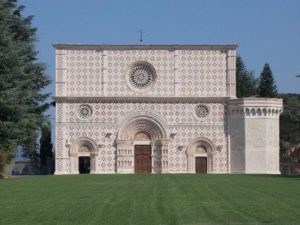
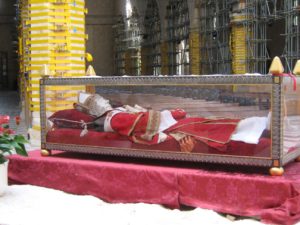
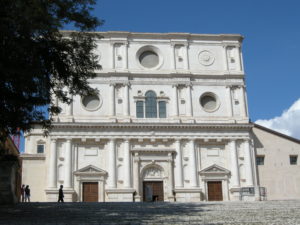
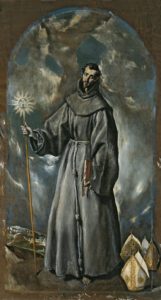
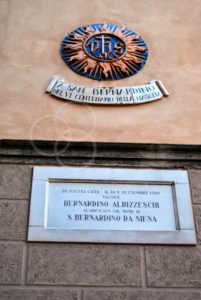
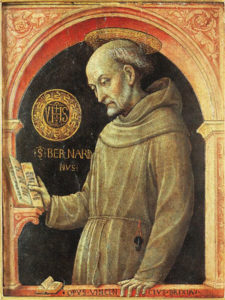
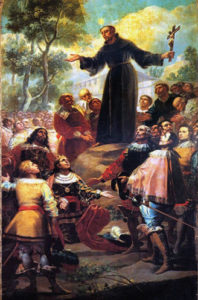
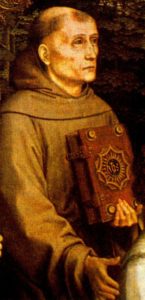
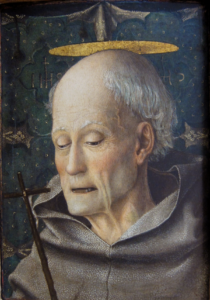
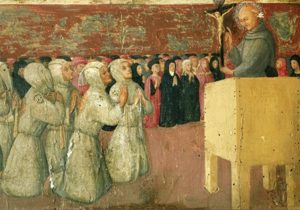
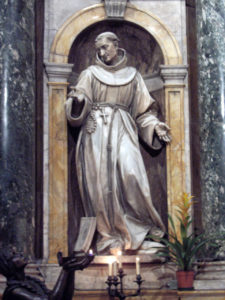
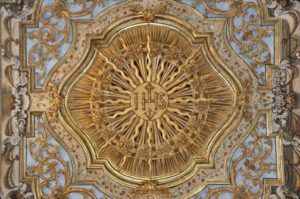
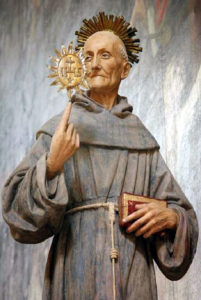
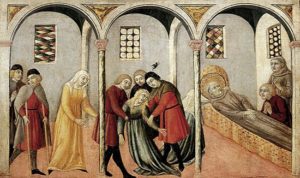
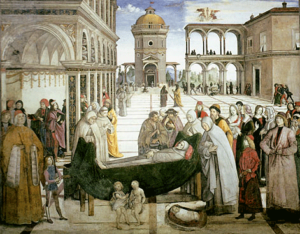
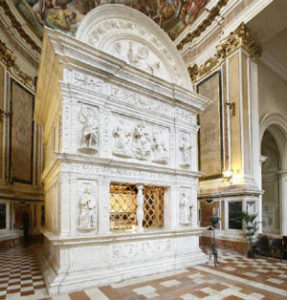
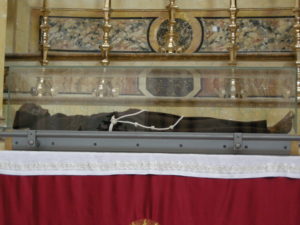
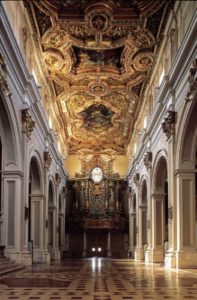
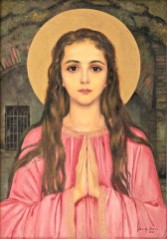
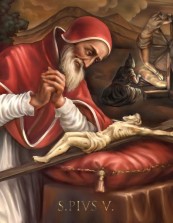
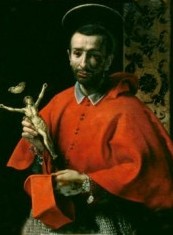
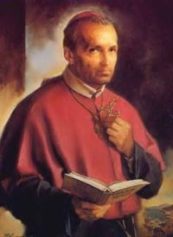
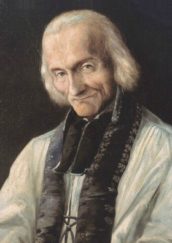
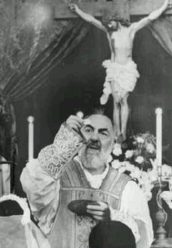
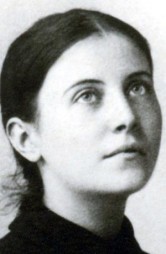
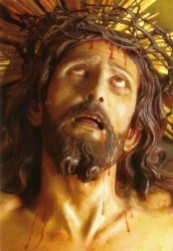
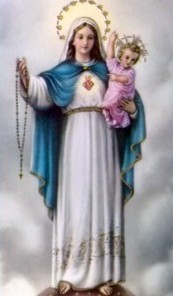
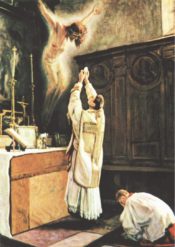
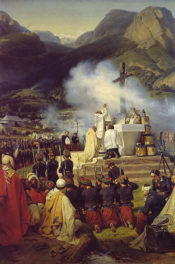
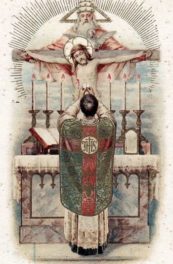
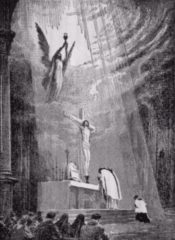
Peace be with all. It is nice to celebrate the saints of God. I celebrated my mass today in memory of Saint Bernardine. May he pray for us before the Lord Jesus Christ. Hope as soon as possible I may know his sanctuary and venerate his body.
Thank you for your comment, Father. Saint Bernardine is a wonderful saint; one of the great Apostles of Europe. Pity he’s not better known in our days. May the good God bless you and help you save many souls!